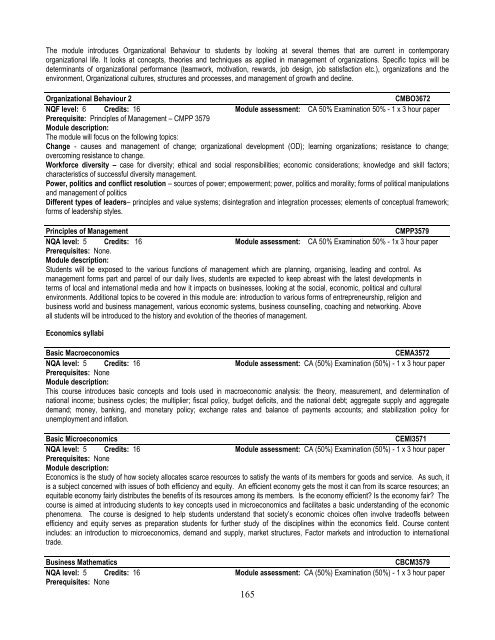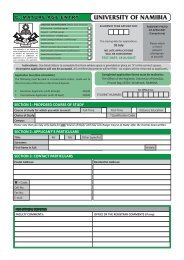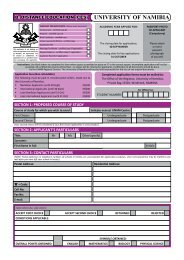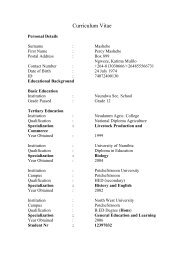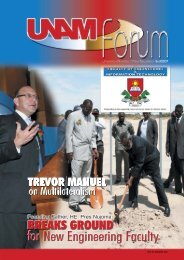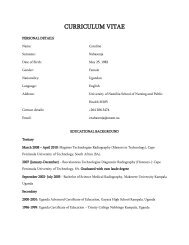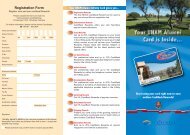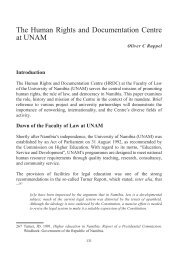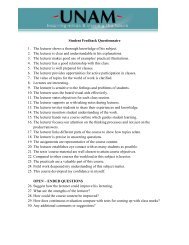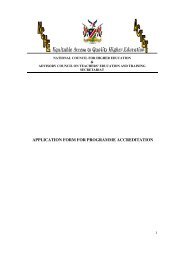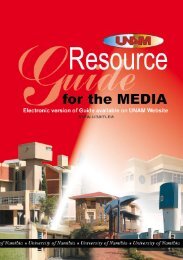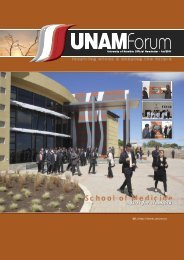UNIVERSITY OF NAMIBIA CENTRE FOR EXTERNAL STUDIES ...
UNIVERSITY OF NAMIBIA CENTRE FOR EXTERNAL STUDIES ...
UNIVERSITY OF NAMIBIA CENTRE FOR EXTERNAL STUDIES ...
You also want an ePaper? Increase the reach of your titles
YUMPU automatically turns print PDFs into web optimized ePapers that Google loves.
The module introduces Organizational Behaviour to students by looking at several themes that are current in contemporaryorganizational life. It looks at concepts, theories and techniques as applied in management of organizations. Specific topics will bedeterminants of organizational performance (teamwork, motivation, rewards, job design, job satisfaction etc.), organizations and theenvironment, Organizational cultures, structures and processes, and management of growth and decline.Organizational Behaviour 2CMBO3672NQF level: 6 Credits: 16 Module assessment: CA 50% Examination 50% - 1 x 3 hour paperPrerequisite: Principles of Management – CMPP 3579Module description:The module will focus on the following topics:Change - causes and management of change; organizational development (OD); learning organizations; resistance to change;overcoming resistance to change.Workforce diversity – case for diversity; ethical and social responsibilities; economic considerations; knowledge and skill factors;characteristics of successful diversity management.Power, politics and conflict resolution – sources of power; empowerment; power, politics and morality; forms of political manipulationsand management of politicsDifferent types of leaders– principles and value systems; disintegration and integration processes; elements of conceptual framework;forms of leadership styles.Principles of ManagementCMPP3579NQA level: 5 Credits: 16 Module assessment: CA 50% Examination 50% - 1x 3 hour paperPrerequisites: None.Module description:Students will be exposed to the various functions of management which are planning, organising, leading and control. Asmanagement forms part and parcel of our daily lives, students are expected to keep abreast with the latest developments interms of local and international media and how it impacts on businesses, looking at the social, economic, political and culturalenvironments. Additional topics to be covered in this module are: introduction to various forms of entrepreneurship, religion andbusiness world and business management, various economic systems, business counselling, coaching and networking. Aboveall students will be introduced to the history and evolution of the theories of management.Economics syllabiBasic MacroeconomicsCEMA3572NQA level: 5 Credits: 16 Module assessment: CA (50%) Examination (50%) - 1 x 3 hour paperPrerequisites: NoneModule description:This course introduces basic concepts and tools used in macroeconomic analysis: the theory, measurement, and determination ofnational income; business cycles; the multiplier; fiscal policy, budget deficits, and the national debt; aggregate supply and aggregatedemand; money, banking, and monetary policy; exchange rates and balance of payments accounts; and stabilization policy forunemployment and inflation.Basic MicroeconomicsCEMI3571NQA level: 5 Credits: 16 Module assessment: CA (50%) Examination (50%) - 1 x 3 hour paperPrerequisites: NoneModule description:Economics is the study of how society allocates scarce resources to satisfy the wants of its members for goods and service. As such, itis a subject concerned with issues of both efficiency and equity. An efficient economy gets the most it can from its scarce resources; anequitable economy fairly distributes the benefits of its resources among its members. Is the economy efficient? Is the economy fair? Thecourse is aimed at introducing students to key concepts used in microeconomics and facilitates a basic understanding of the economicphenomena. The course is designed to help students understand that society’s economic choices often involve tradeoffs betweenefficiency and equity serves as preparation students for further study of the disciplines within the economics field. Course contentincludes: an introduction to microeconomics, demand and supply, market structures, Factor markets and introduction to internationaltrade.Business MathematicsCBCM3579NQA level: 5 Credits: 16 Module assessment: CA (50%) Examination (50%) - 1 x 3 hour paperPrerequisites: None165


